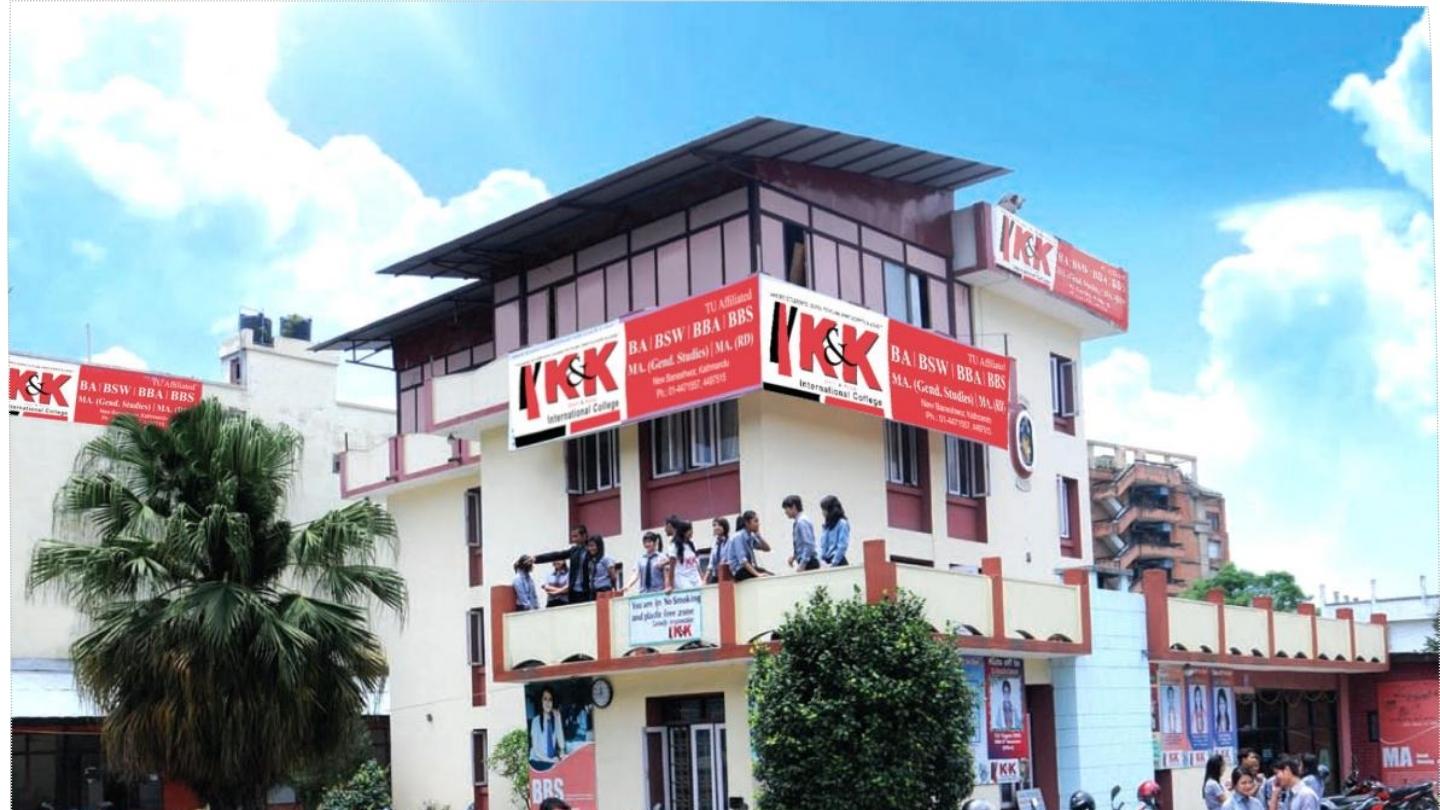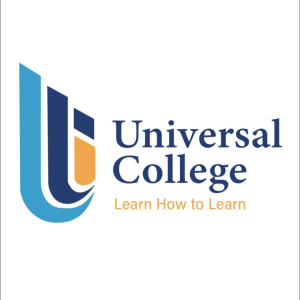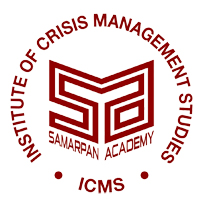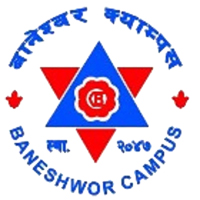Overview
Master of Arts in Rural Development Studies (MRDS) at K and K International College, New Baneshwor, Kathmandu
The Master of Arts in Rural Development Studies (MRDS) at K and K International College (K&K), New Baneshwor, Kathmandu, runs under Tribhuvan University’s Faculty of Humanities and Social Sciences.
The two-year, four-semester structure focuses on rural development theory, local governance, planning, project management, livelihoods, environment, research methods, and a thesis.
The campus location opposite the International Convention Centre (BICC) supports daily commuters. Library access, computer labs, and scheduled classrooms help you keep pace with readings, field-linked tasks, and presentations.

Overview
This MRDS profile gives you accurate, program-specific information for planning study and work paths in Nepal’s development sector. The curriculum follows Tribhuvan University rules. K&K delivers courses within that framework and provides learning spaces suited to seminar work, data practice, and guided field assignments.
The degree builds from core concepts and policy frameworks to applied tools that you can use in municipalities, NGOs, cooperatives, and development projects. Short, consistent outputs—briefs, tables, charts, presentations—create a paper trail that helps with both job applications and further study.
Highlights
-
Program length: Two academic years, four semesters
-
Affiliation: Tribhuvan University, Faculty of Humanities and Social Sciences
-
Academic focus: Rural development theory, local governance, project cycle, livelihoods, environment, research methods, thesis
-
Learning mode: Classroom study, seminar tasks, compact field-linked assignments, guided thesis
-
Campus support: Library access, computer lab, scheduled classrooms, clubs and sports in New Baneshwor (opposite BICC)
Curriculum Details
K&K follows Tribhuvan University’s MRDS structure. Semester progression moves from concepts and institutions to planning tools, data tasks, and supervised research writing. Each semester blends core papers, supporting modules, and compact assignments that prepare you for the thesis.
Semester I: Foundations and Context
Courses introduce rural development theory, Nepal’s administrative structures, and the roles of local governments and community organizations. Students read policy provisions, map institutions, and write short notes that connect rules to local practice. A study skills module reinforces reading strategies, note-making, and citation.
Semester II: Planning and Project Cycle
Focus shifts to problem analysis, stakeholder mapping, logic models, activity scheduling, budgeting, and monitoring. Students practice a simple problem tree, a results chain, a work plan, and a basic budget sheet. A short field-linked task documents a meeting or site observation with dated notes and photos where allowed.
Semester III: Livelihoods, Environment, and Methods
Modules examine agriculture and nonfarm livelihoods, value chains, small enterprise, community groups, natural resources, and environmental concerns in rural settings. Research methods cover sampling ideas, questionnaires, key-informant interviews, and basic statistics. Students enter data into spreadsheets, compute summaries, and produce clean tables and charts.
Semester IV: Governance in Practice and Thesis
Seminar work addresses public finance basics, social accountability tools, and program reporting. Students complete a thesis under supervision. The thesis process includes proposal approval, data collection, analysis, draft chapters, revisions, and viva or final presentation as set by the department. Emphasis stays on clear method, ethical steps, and usable findings.
Assessment pattern: Internal tasks (attendance, assignments, presentations, short papers) and end-of-semester examinations, followed by thesis submission and defense per Tribhuvan University rules. Classroom work trains you to write in clear, neutral language that supports evidence-based decision making.
Objectives
The MRDS aims to help students:
-
Understand rural development concepts, institutions, and planning cycles in Nepal.
-
Analyze local issues using small data sets, documents, and structured reasoning.
-
Plan modest projects with logic models, activity schedules, and budget outlines.
-
Document meetings, field visits, and program steps with clean, dated records.
-
Research a focused question, apply ethical steps, and report findings in a thesis.
Scope
Graduates enter roles that require documentation, coordination, and practical planning. Projects in livelihoods, WASH, agriculture, social protection, education support, or local infrastructure need program staff who can read policies, manage records, and prepare short reports. Municipal offices and cooperatives also seek team members who can link local needs to planning and budgeting cycles.
Some graduates move into research units or monitoring and evaluation (M&E). Others prepare for higher-level study in development, public administration, or related fields after building professional experience with reliable outputs.
Learning Outcomes
By graduation, students typically can:
-
Explain the roles of rural institutions and the steps in planning and budgeting.
-
Draft a practical results chain and a short work plan with a budget outline.
-
Collect field data, compute summaries, and present simple charts and tables.
-
Write policy briefs, meeting minutes, and progress notes in clear language.
-
Complete a thesis that documents question, method, data, and findings with correct citation.
Skill Development Modules
The program builds steady habits in reading, data handling, writing, presentation, and ethical field practice. Instructors share a course plan each term that lists internal tasks and deadlines. Lab hours support charting and formatting; library sessions reinforce reference management.
Micro-checklist for each semester
-
Reading log: Summarize one core reading per week in 250–400 words.
-
Policy card: Record key clauses and a simple use case for one policy area.
-
Data habit: Convert tallies into a spreadsheet table the same day and add one chart.
-
Writing drill: Produce a one-page memo linking problem, evidence, and next steps.
-
Talk practice: Deliver a five- to ten-minute update with three slides before mid-term.
Teaching Methodology
Classes combine short explanations, worked examples, and group tasks. Internal evaluation can include attendance, quizzes, assignments, presentations, and a short paper or field-linked brief where assigned. The approach helps you move from definitions to applied outputs in steady steps, so you are ready for end-of-semester examinations and thesis writing.
Faculty guide you through proposal development, data ethics, and chapter drafts. Students learn how to structure a literature section, describe methods without jargon, and present honest limitations alongside results.
Admission Requirements
-
Eligibility: A bachelor’s degree from a university recognized by Tribhuvan University. Documents must confirm subjects taken and grades or division.
-
Selection: K&K follows Tribhuvan University rules for MRDS admissions and may schedule screening, written tests, or interviews as announced for the intake.
-
Documents: Academic transcripts and character certificates, copies of ID, recent photos, and any forms requested during the admission window.
Before you apply
-
Collect records: Scan transcripts, ID, and photos into a single folder.
-
Track notices: Note forms, deadlines, and any entrance or interview dates.
-
Write a one-page note: State a rural topic that interests you and one potential question for thesis planning.
Career Opportunities
Entry roles include program officer, field coordinator, community development officer, M&E assistant, research assistant, and cooperative support staff. Typical tasks cover planning notes, stakeholder lists, session logistics, simple budgets, data entry, and short reports. The thesis, policy briefs, and charts you prepare during the degree become writing samples for recruitment.
Projects value steady attendance, careful documentation, and respectful communication with communities. Municipal offices look for staff who can relate ward feedback to budgets and work plans. Research units and consultancies need assistants who can code responses and produce clean tables on time.
Scholarships and Financial Aid
Scholarship notices appear during admission. Categories can include merit and need-based support under published rules. Students should prepare citizenship or ID, academic records, and any supporting letters requested for screening. Deadlines follow the intake calendar, so early submission helps.
Why Choose This Course?
Students who want a Nepal-focused path into development practice find MRDS steady and practical. The semester rhythm shapes clear milestones, from policy reading and planning tools to field-linked briefs and a thesis. The New Baneshwor campus near BICC supports commuters, and campus facilities—library access, lab time, and scheduled classrooms—help you meet submission dates and maintain a consistent study routine.
Conclusion
The MRDS at K&K follows Tribhuvan University’s framework from classroom work to thesis completion. You learn how institutions function, plan small projects, handle basic data, and write in a clear, neutral style. If you maintain attendance, plan weekly tasks, and build a clean paper trail each term, you finish with a thesis and a set of documents—briefs, tables, charts, and slides—that support both employment and future study.
FAQ
What is the length of the MRDS at K&K?
Two academic years across four semesters under Tribhuvan University.
Does the program require a thesis?
Yes. Students complete a supervised thesis with proposal approval, data collection, analysis, draft chapters, and a final defense or presentation.
What kinds of field-linked tasks are common?
Meeting notes, short site observations, basic surveys, and compact memos that connect findings to a plan or policy action.
Which skills help most in early roles?
Clear writing, spreadsheet skills, simple budgeting, respectful communication, and reliable record-keeping.
Which facilities support study on campus?
The library, computer lab, and scheduled classrooms in New Baneshwor support reading, charting, and presentations.





















